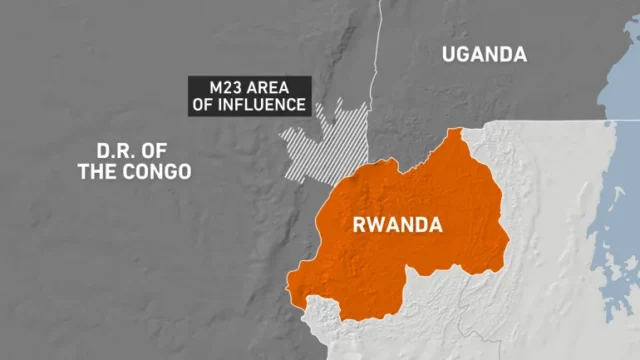INTERNATIONAL

RWANDA, DRC SIGN PEACE DEAL IN WASHINGTON
Rwanda, DRC Sign Peace Deal in Washington as Trump Highlights Mineral Gains
Rwanda and the Democratic Republic of Congo (DRC) on Friday signed a peace agreement in Washington, aiming to end a deadly conflict that has claimed thousands of lives. The two nations pledged to withdraw support for armed rebel groups, marking a step toward restoring stability in the conflict-ridden Great Lakes region.
The agreement follows a year of intense fighting led by the M23 rebel group — an ethnic Tutsi militia with reported links to Rwanda — which made rapid gains in eastern DRC, capturing large swaths of territory including the strategic city of Goma.
Speaking at the White House during the official signing, U.S. President Donald Trump hailed the accord as a breakthrough for regional peace — and also took the opportunity to emphasize the economic upside.
“Today, the violence and destruction comes to an end, and the entire region begins a new chapter of hope and opportunity,” Trump said, calling it “a wonderful day” as he welcomed the foreign ministers of both countries.
Trump also boasted that the deal secures critical access to the region's vast mineral resources, a move he framed as a win for U.S. interests and global stability.
The mineral-rich eastern DRC is home to some of the world’s most valuable deposits of cobalt, coltan, and gold — resources that have long fueled both development hopes and deadly conflicts.
The peace agreement is seen as a crucial step in reducing tensions between Rwanda and the DRC, who have accused each other of backing rival militias. It remains to be seen how quickly the pledged withdrawal of support for guerrilla fighters will be implemented — and whether the M23 will halt its advance.
Rwanda, DRC Peace Deal Omits M23 Gains, Targets Hutu Militants
The peace agreement signed Friday in Washington between Rwanda and the Democratic Republic of Congo (DRC) marks a significant diplomatic step toward ending years of bloodshed in eastern Congo. However, the deal — brokered by Qatar in quiet diplomacy dating back to before U.S. President Donald Trump took office — notably sidesteps direct reference to territorial gains made by the M23 rebel group.
While the M23, a Tutsi-led rebel force widely believed to have ties to Rwanda, captured key areas including the strategic city of Goma earlier this year, the agreement does not call for their withdrawal. Instead, it urges Rwanda to halt unspecified "defensive measures" taken within the DRC.
Rwanda has consistently denied backing the M23 but has long pushed for action against another group — the Democratic Forces for the Liberation of Rwanda (FDLR), a militia founded by ethnic Hutus, including figures linked to the 1994 Rwandan genocide against the Tutsi population.
The new peace deal calls for the “neutralisation” of the FDLR. Speaking in Washington, Rwandan Foreign Minister Olivier Nduhungirehe said the top priority should be “the irreversible and verifiable end to state support” for the Hutu militia.
“The FDLR remains a threat to Rwanda’s security and regional peace. Addressing that threat is the first order of business,” Nduhungirehe stated.
Though framed as a path to lasting peace, the deal leaves unresolved questions about control of rebel-held territory and the fate of M23 fighters — potentially setting the stage for complex implementation ahead.
Rwanda, DRC Peace Deal Includes Security Oversight, Economic Framework Amid Uncertainty
At a signing ceremony held at the U.S. State Department, Rwandan and Congolese officials formalized a peace agreement aimed at ending years of cross-border violence and rebel activity in eastern Democratic Republic of Congo (DRC). While the deal outlines important steps toward stability, both sides acknowledged the fragile nature of the accord.
Rwanda’s Foreign Minister, Olivier Nduhungirehe, stated that his country would begin easing its so-called “defensive measures” in the DRC — widely interpreted as indirect military involvement — as part of the peace process.
“This process will be accompanied by a lifting of Rwanda’s defensive measures,” Nduhungirehe confirmed. However, he cautioned that the region has seen similar accords fall apart in the past. “We must acknowledge that there is a great deal of uncertainty in our region, and beyond, because many previous agreements have not been implemented.”
Congolese Foreign Minister Therese Kayikwamba Wagner emphasized that the agreement affirms respect for national sovereignty, a core concern for Kinshasa amid accusations of foreign interference in its mineral-rich east.
“It offers a rare chance to turn the page, not just with words but with real change on the ground,” she said. “Some wounds will heal, but they will never fully disappear.”
As part of the deal, a joint security coordination body will be established to oversee implementation and maintain accountability. The agreement also calls—albeit vaguely—for the creation of a regional economic integration framework within three months, aimed at fostering cooperation and development beyond military issues.
While the accord has been welcomed as a diplomatic breakthrough, analysts note that its success will depend heavily on political will, credible enforcement, and tangible steps to address the presence of armed groups such as M23 and the FDLR.
"This represents a significant development in our ongoing coverage of current events."— Editorial Board









